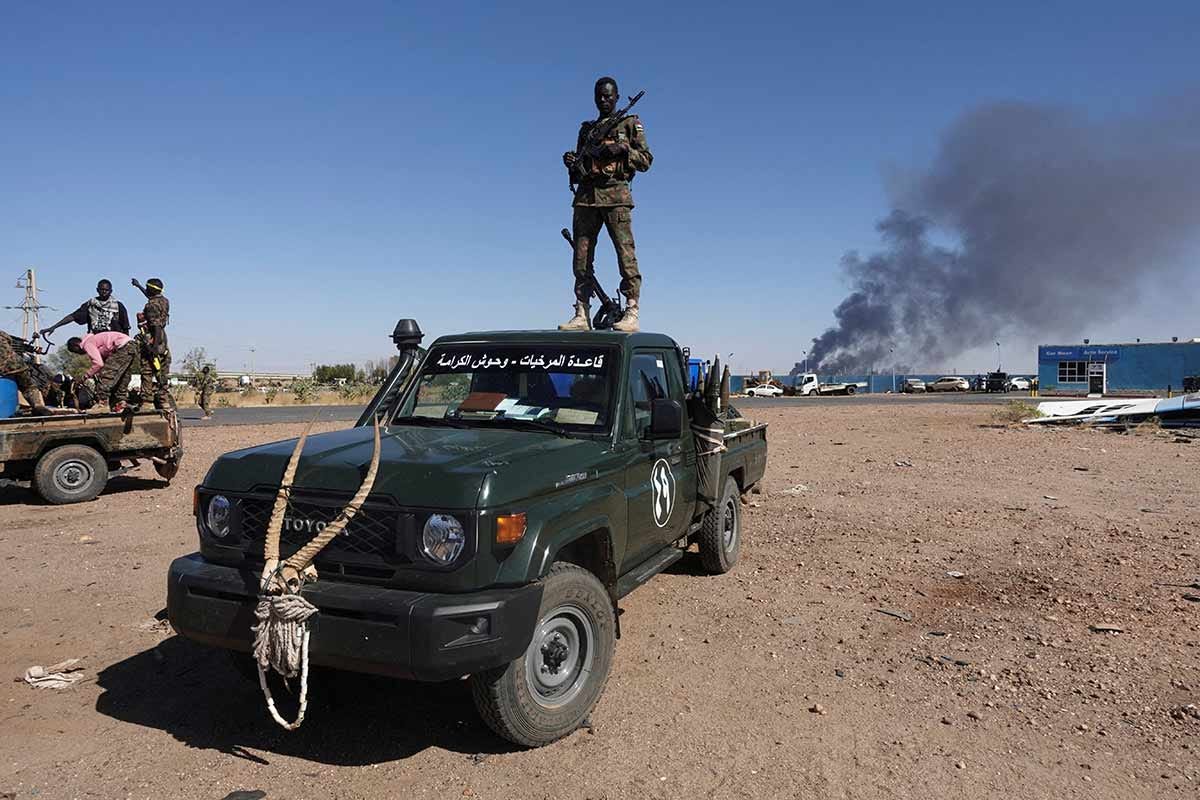Weekly Outlook: Sudan war spills over into CAR, PKK in Iraq will disarm, Israel and Syria move towards normalization (June 29–July 5)
A weekly outlook covering the latest security crises, geopolitical trends, and upheavals across the Middle East and North Africa.

Sudan war spills over into the Central African Republic
Last week, a United Nations peacekeeper based in the Central African Republic (CAR) was killed along the CAR-Sudan border.
The peacekeeper, identified as Zambian Stephen Muloké Sachachoma, was killed by armed men in the village of Am-Sissia 1, based in northern CAR next to the country’s border with Sudan.
In response, Zambian foreign minister Mulambo Haimbe called for the perpetrators to be brought to justice.
“Zambia remains resolute in its commitment to advancing international peace and security as a foundation for sustainable development, both at regional and global levels,” Haimbe declared.
UN Undersecretary General Jean-Pierre Lacroix identified the perpetrators as “armed Sudanese elements.” Although no Sudanese party has edclaim responsibility, analysts suspect the Rapid Support Forces (RSF) to be the attackers, given that RSF vehicles have been frequently sighted in the area.
This marks the second time in June that the Sudan war has spilled over into neighboring states.
The first occurred along the Sudan-Libya border, where the Sudanese Armed Forces (SAF) clashed with Libyan militias under the command of General Khalifa Haftar. Following the confrontation, the SAF quickly evacuated the area, which the RSF seized control of. The SAF has previously accused Haftar of backing the RSF, a claim Haftar denies.
The spillover effect points to the failures of the international community in addressing Sudan’s conflict. Given the country’s strategic location—surrounded by several other fragile states and lying along the Red Sea—spillover was always a high probability for the war.
Foer the remainder of the summer, we’ll likely see more brief clashes such as these to occur along Sudan’s borders with its neighbors. However, as international actors remain focused on conflicts elsewhere, it’s unlikely the war will remain contained much longer.
Iraqi PKK to disarm
The Kurdish media outlet Rudaw reported that the Iraqi Kurdistan Workers' Party (PKK) will disarm this July.
According to the report, between “20 and 30” PKK Iraqi fighters will lay down their weapons between “July 3 and July 10.”
The official disarmament will take place as part of a ceremony to be hosted in the city of Sulaimaniyah, Iraqi Kurdistan’s second-biggest city.
The agreement is part of a larger peace settlement framework settled between the PKK and the Turkish government earlier in February. The deal will see the dissolution of the PKK in exchange for improved rights and integration into Turkish society.
A guerrilla armed movement, the PKK has long fought for Kurdish autonomy across Kurdistan—a region spanning Turkey, Iraq, Syria, and Iran. The group includes forces based in Iraqi Kurdistan, situated in the north of the country.
Kurds were frequently targeted under the Arab nationalist regimes of Saddam Hussein in Iraq and Bashar al-Assad in Syria.
2025 has witnessed a pivot in Kurdish postering across the region, however. Along with the Turkish agreement, Syrian transitional President Ahmed al-Sharaa signed a peace agreement in March with the Kurdish-led Syrian Democratic Forces (SDF), under which the SDF will be integrated into government institutions in exchange for full recognition of Kurdish rights.
The Iraqi PKK announcement marks another step forward as part of this regional momentum.
Israel eyeing normalization with Syria and Lebanon
In an interview with journalists, Israeli Foreign Minister Gideon Saar expressed interest in normalizing relations with other Arab states across the region.
“Israel is interested in expanding the Abraham Accords circle of peace and normalization,” Saar stated, referencing the Abraham Accords—a 2020 peace settlement which normalized relations between Israel and the United Arab Emirates, Bahrain, Sudan, and Morocco.
Saar is particularly hopeful that Syria and Lebanon could join the fold of Arab-Israeli normalization.
“We have an interest in adding countries such as Syria and Lebanon, our neighbors—to the circle of peace and normalization while safeguarding Israel's essential and security interests,” Saar said.
Syria and Lebanon have traditionally been among Israel’s chief Arab rivals, with both Damascus and Beirut remaining technically at war with Tel Aviv.
However, recent dynamics have changed the calculus of the Arab-Israeli conflict.
With the collapse of former President Assad—a close ally of Iran—transitional President Sharaa is aiming to end Syria’s international isolation. As part of this, Sharaa has realigned Syria with states that previously opposed Assad’s regime, including the Gulf and the United States.
As part of this wider campaign, Sharaa seems to be receptive to also normalizing relations with Israel.
When asked by Congressman Marlin Stutzman in April if he’d be open to the possibility of a peace agreement with Israel, Sharaa replied he would “absolutely” be under the right conditions.
In Lebanon, Iran’s most powerful proxy Hezbollah has been battered by Israel’s intervention in 2024. Furthermore, a growing nationalist, anti-Iranian movement has been brewing in Lebanon for several years, as a backlash to the Islamic Republic’s grip over Beirut. Given this, Lebanon may be eyeing normalization with Israel to escape Iran’s orbit.
However, challenges remain towards either state joining the Abraham Accords. Notably, public opinion across the Arab world remains staunchly opposed to normalization with Israel given the Gaza war. For example, although over 15% of Lebanese polled in 2021-2022 expressed support for normalization, now only a little over 10% do as of 2023-2024.
As such, any discussions between Israel and its Arab neighbors would be most likely at best lay the groundworks for future normalization, but it’s unlikely a full peace settlement will be determined soon.
What do you think lies ahead for the Middle East & North Africa this week? Will the Sudan war continue to spillover? What if the PKK decides not to disarm? Will Israel normalize with Syria and Lebanon? Let me know down below!




